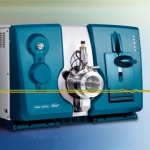
Sponsored • Innovation
A New Chapter for Clinical Lab LC-MS/MS Systems
Every day you’re challenged to deliver faster, reliable results to inform clinicians. Now the power of LC-MS/MS technology is available with the Topaz™ System from SCIEX, developed with the demanding clinical lab in mind. It is the first FDA-reviewed integrated LC-MS/MS IVD system, that is open by design and closed when you need it.


























